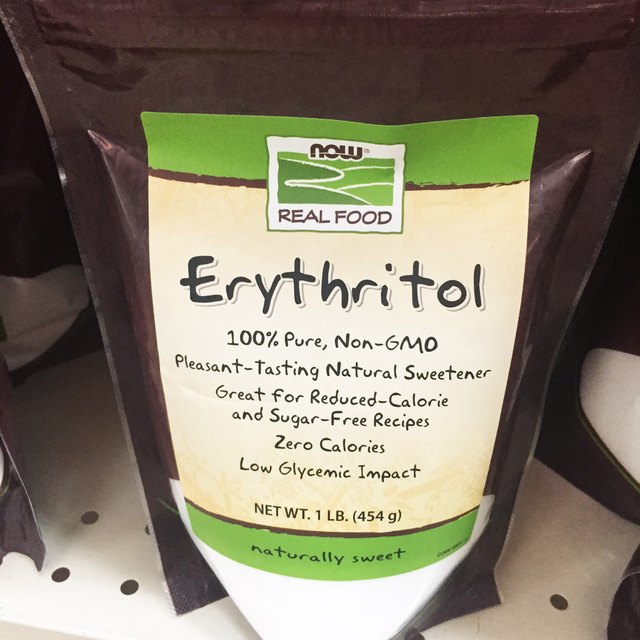
Foods listed as "sugar free" or "no sugar added" may seem like a good alternative if you are cutting down on sugar, if you have diabetes and/or if you are following a low-carb diet for weight loss. These foods are commonly sweetened using sugar alcohols such as erythritol, which tastes like sugar but contains almost zero calories. While sugar alcohols have several advantages such containing almost no calories, not causing a spike in blood sugar and not causing tooth decay, they also have a few disadvantages. Erythritol can cause side effects such as diarrhea, headache, and stomachache in some people and/or when consumed in large doses. Read on to better understand all the risks and benefits.
What Is Erythritol?

Erythritol is a sugar substitute that looks and tastes like sugar, yet has almost no calories. It is available in both granulated and powdered forms.
A sugar alcohol, erythritol has been approved for use as a food additive in the United States and in many other countries. Other sugar alcohols you may have heard of include xylitol, maltitol, sorbitol and lactitol.
A sugar alcohol, erythritol has been approved for use as a food additive in the United States and in many other countries. Other sugar alcohols you may have heard of include xylitol, maltitol, sorbitol and lactitol.
Can Erythritol Cause Digestive Upset?

In small amounts, erythritol is not supposed to cause digestive upset and diarrhea that other sugar alcohols like sorbitol and xylitol are known to cause, because erythritol is a smaller molecule and 90 percent of erythritol is absorbed in the small intestine and excreted for the most part unchanged in urine.
There are some people who report side effects such as diarrhea, stomach upset, and headache after consuming regular amounts of erythritol in food or beverages. The amount needed to cause symptoms varies greatly based on your individual tolerance. Some find that even small amounts of sugar alcohols upset their stomach, while others can tolerate higher amounts before they experience gastrointestinal symptoms.
Consuming over 50 grams of erythritol may result in nausea or stomach rumbling.
There are some people who report side effects such as diarrhea, stomach upset, and headache after consuming regular amounts of erythritol in food or beverages. The amount needed to cause symptoms varies greatly based on your individual tolerance. Some find that even small amounts of sugar alcohols upset their stomach, while others can tolerate higher amounts before they experience gastrointestinal symptoms.
Consuming over 50 grams of erythritol may result in nausea or stomach rumbling.
Does Erythritol Spike Blood Sugar or Insulin?
Erythritol is described as having a zero glycemic index, and it has not been found to affect blood sugar or insulin levels. For these reasons, erythritol is popular with people on low-carb diets.
In a 1994 Japanese study published in the European Journal of Clinical Nutrition under the title "Serum glucose and insulin levels and erythritol balance after oral administration of erythritol in healthy subjects," of five healthy male volunteers aged 45-58 years, they found that "Erythritol did not increase serum levels of glucose or insulin." They also found that erythritol did not induce any significant effects on serum levels of total cholesterol, triacylglycerol or free fatty acids.
In a 1994 Japanese study published in the European Journal of Clinical Nutrition under the title "Serum glucose and insulin levels and erythritol balance after oral administration of erythritol in healthy subjects," of five healthy male volunteers aged 45-58 years, they found that "Erythritol did not increase serum levels of glucose or insulin." They also found that erythritol did not induce any significant effects on serum levels of total cholesterol, triacylglycerol or free fatty acids.
Concerns About Erythritol and Other Low-Calorie Sweeteners

When you eat food, your brain registers that you've eaten and signals your body to release hormones that decrease your appetite. Because sugar alcohols pass through the body largely undigested, you won't experience the same satiating signals as you would with food sweetened conventionally, according to Jim Smith, author of the "Food Additives DataBook." This means you may be left still feeling hungry and opt to eat more, which defeats the purpose of eating foods sweetened with sugar alcohols for lower-calorie purposes.
Erythritol Does Not Cause Tooth Decay
One important advantage of erythritol is that it does not cause tooth decay. This was shown in a 1992 study titled "Noncariogenicity of erythritol as a substrate."
The harmful bacteria in our mouths can use sugar for energy that helps them grow and multiply and erode our teeth. But erythritol is different; it cannot be metabolized by oral bacteria, and it does not cause cavities.
The harmful bacteria in our mouths can use sugar for energy that helps them grow and multiply and erode our teeth. But erythritol is different; it cannot be metabolized by oral bacteria, and it does not cause cavities.
What Happens to Erythritol Inside Our Bodies?

Only about 10 percent of erythritol we consume enters the colon. Most of the erythritol consumed is rapidly absorbed in the small intestine, and then after traveling through the bloodstream, 90 percent of it is excreted in the urine, according to a 2005 paper titled "Human gut microbiota does not ferment erythritol."
Because most of the erythritol is absorbed into the body before it gets to the colon, it does not normally cause the laxative effects that some individuals experience after consumption of other sugar alcohols, such as xylitol and maltitol.
Because most of the erythritol is absorbed into the body before it gets to the colon, it does not normally cause the laxative effects that some individuals experience after consumption of other sugar alcohols, such as xylitol and maltitol.
Final Conclusions About Erythritol
In conclusion, erythritol has several advantages over sugar: it contains almost no calories, it does not cause tooth decay and it does not spike blood sugar.
Erythritol should not cause digestive upset in most people unless it is consumed in large quantities of over 50 grams.
All of this said, our recommendation is that our readers still need to be cautious not to overindulge on foods containing erythritol. The reason for this is: most foods that use sugar alcohols as sweeteners still contain a significant quantity of carbohydrates, fat and calories, according to the American Diabetes Association. If you're choosing foods sweetened with sugar alcohols for weight loss reasons, you may not be giving yourself an advantage.
When choosing foods with sugar alternatives, check the food facts label, and compare the nutritional information to conventionally sweetened foods to determine which is the best choice for you.
Erythritol should not cause digestive upset in most people unless it is consumed in large quantities of over 50 grams.
All of this said, our recommendation is that our readers still need to be cautious not to overindulge on foods containing erythritol. The reason for this is: most foods that use sugar alcohols as sweeteners still contain a significant quantity of carbohydrates, fat and calories, according to the American Diabetes Association. If you're choosing foods sweetened with sugar alcohols for weight loss reasons, you may not be giving yourself an advantage.
When choosing foods with sugar alternatives, check the food facts label, and compare the nutritional information to conventionally sweetened foods to determine which is the best choice for you.





No comments:
Post a Comment